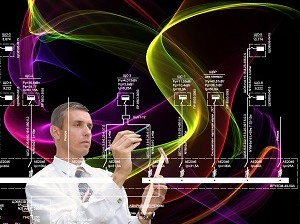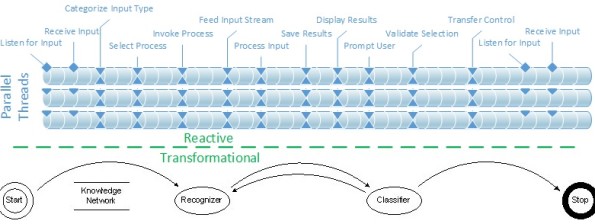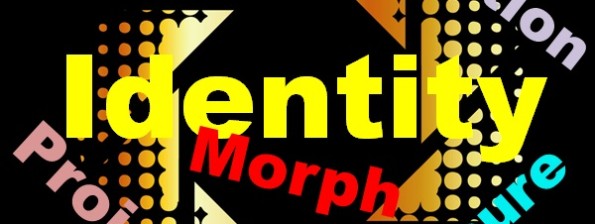Tag Archives: cybernetics
28 Jul Patterns in the Mind

As we look for suitable solution designs for representing the knowledge and processes we humans use to communicate, we realize that we have no idea what knowledge in the brain looks like. Further, we only have relatively vague ideas about the processes that occur in the brain as we produce and comprehend words, phrases and sentences. […]
26 Jul Parallel Distributed Pattern Processing

PDP Networks We have discussed recognition processes in the brain. Connectionism, a fundamentally implicit approach to neural modeling, was championed by the parallel distributed processing (PDP) group. PDP networks use many interconnected processing elements (PEs) that, according to the PDP Group, configure themselves to match input data with “minimum conflict or discrepancy” (Rumelhart & McClelland, 1986, Vol. 2, […]
24 Jul Pattern Classification in Space

Pattern Classification Visual patterns can be recognized and classified based on prior knowledge: I see that this hairy animal has four legs and is about the same size as my dog, so I’ll assume it is (or classify it as) a dog. This may not be a correct classification, but it’s more correct than classifying it […]
15 Jul From Perception and Learning to Logic

Perception and Learning I am not a cognitive scientist, so all I have said in this section is based on the work of others. On the other hand, I have probably spent more time seriously studying cognition than most computer geeks, and I have tried to form my perspectives around the best of our knowledge. The […]
07 Jul SPARQL Fireworks

How do you get at knowledge in conceptually structured information stores such as graphs? There are multiple ways to get data and information in broad use today. The most common is Structured Query Language (SQL) which is used as the almost universal access formalism for getting, storing and manipulating data in relational databases. An emerging standard […]
03 Jul Do Yawl do Petri Nets

Where do you draw a line? In geometry, digital theory, language and time, patterns tend to be linear: they bear distinct sequences. The sequences in these domains either contribute to the meaningfulness of the patterns, or, in the case of time, are the foundation of the patterns. Any logic that focuses on these sequential patterns is linear logic. Temporal Logic […]
01 Jul Chaos About Us

Chaos About Us Chaos is all about us. I know that for certain each time I look into my kids’ rooms. When I recall my own youth, however, it occurs to me that I had a reason for the way I organized my life. It seemed meaningful to me, and although I recall how difficult it was […]
23 Jun Information Transformation

Information Exchange and Transformation Knowledge does the most good when shared. Knowledge that gets lodged in one place may not be particularly useful to many people. But moving digital information from place to place has its dangers. Automating data movement can introduce security or confidentiality issues, data duplication challenges, as well as raising the specter of […]






